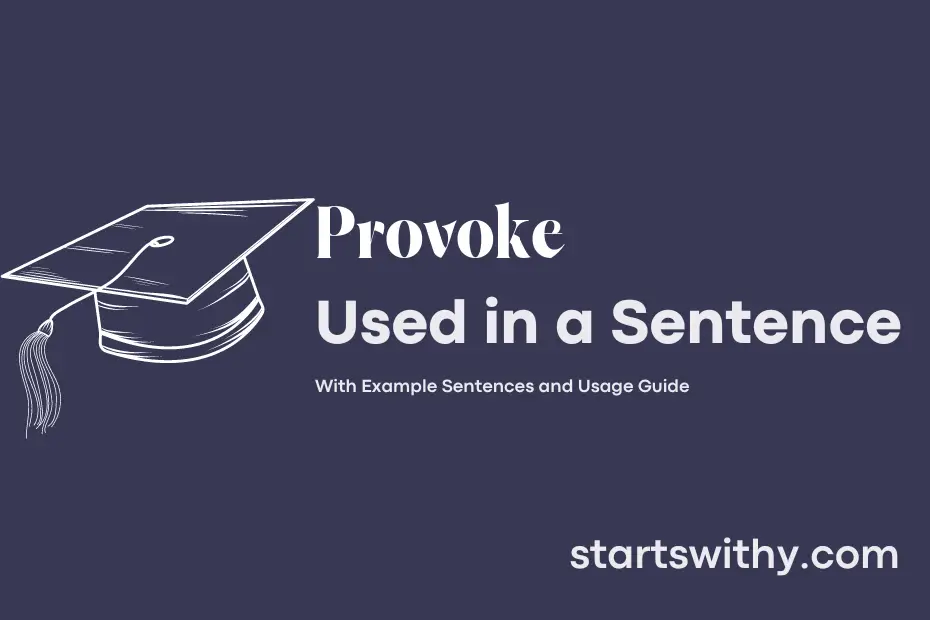Have you ever wondered how to craft an example sentence that effectively provokes a thought or emotion in your reader? When it comes to writing a sentence that incites a reaction or contemplation, the key is to choose your words carefully to elicit a specific response from your audience.
To provoke means to stimulate or evoke a particular feeling, thought, or reaction through words or actions. In the context of writing, a provocative sentence is one that grabs the reader’s attention, sparks curiosity, or prompts a deeper reflection on the topic at hand.
7 Examples Of Provoke Used In a Sentence For Kids
- Provoke means to make someone feel angry or upset.
- It is not nice to provoke your friends while playing games.
- If someone tries to provoke you, you can talk to a teacher or an adult.
- We should always try to be kind and not provoke others.
- It’s important to use our words to solve problems instead of trying to provoke someone.
- Saying mean things can provoke others to feel sad or mad.
- Remember, it’s never okay to provoke someone on purpose.
14 Sentences with Provoke Examples
- Provoke thoughtful discussions in your classroom by asking challenging questions.
- It is never okay to provoke someone into an argument just to prove a point.
- The controversial guest speaker’s opinions were meant to provoke a reaction from the audience.
- It’s important to handle situations diplomatically and not provoke unnecessary conflicts.
- Peer pressure can sometimes provoke students into making poor decisions.
- The student’s rebellious behavior was meant to provoke a response from the faculty.
- The provocative artwork was intended to provoke a dialogue about societal issues.
- It’s essential to maintain a calm demeanor in situations that provoke anger.
- Engaging in constructive debates can provoke critical thinking among students.
- When faced with criticism, it’s best not to provoke a defensive response.
- Some professors intentionally provoke students to think outside the box with challenging assignments.
- The controversial film was created to provoke a reaction from the audience and spark discussions.
- Be cautious with your words as they can easily provoke misunderstandings and conflicts.
- The student’s behavior was intended to provoke a reaction from their peers for attention.
How To Use Provoke in Sentences?
Provoke can be used in a sentence to express a sense of incitement or stimulation towards a particular reaction or response.
To use Provoke in a sentence, follow these steps:
-
Identify the situation where you want to use the word Provoke. This could be when you want to describe someone causing a strong emotional reaction in another person.
-
Select the subject of the sentence. This could be a person, group, or event that is causing the provocation.
-
Choose the action or emotion that is being incited. This could be anger, laughter, curiosity, etc.
-
Combine all these elements to construct a sentence. For example, “Her bold comments provoked a heated debate among the audience.”
-
Make sure that the sentence is clear and that the context in which Provoke is used is apparent.
By following these steps, you can effectively use Provoke in a sentence to convey the idea of inciting or stimulating a reaction. Practice using Provoke in different contexts to become more comfortable with incorporating it into your vocabulary.
Conclusion
In conclusion, the examples of sentences with the keyword “provoke” demonstrate its use in inciting reactions or emotions. Whether it’s invoking anger through insensitive remarks or sparking creativity with thought-provoking ideas, the word “provoke” carries a strong connotation of stirring a response in others. It underscores the power of language to elicit various reactions, from controversy to inspiration.
By exploring these sentences, we can appreciate how language can be wielded to provoke thought, action, or emotion. From simple everyday interactions to complex artistic expressions, the word “provoke” serves as a reminder of the impact words can have on our perceptions and behaviors.



